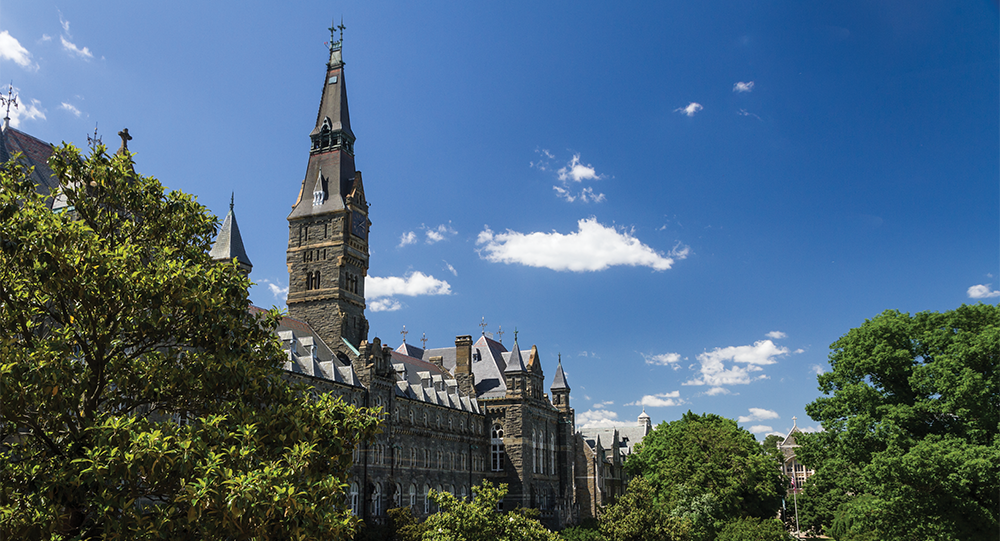
Washington, D.C. area colleges, including Georgetown, have come under fire for being exempt from $111 million in local property taxes.
Universities in Washington, D.C., are exempt from $111 million in local taxes as a result of their nonprofit status, despite recent calls by local leaders to cut tax breaks on large, wealthy universities including Georgetown University and The George Washington University.
Currently, both public and private universities file their taxes under a nonprofit status, recusing them from paying any city or state property taxes. As a result, Georgetown University avoided a $9 million sum, while GWU and American University avoided paying $39 million and $11 million, respectively, according to The Washington Post.
Critics advocate for a payment in lieu of taxes, or PILOT, a program previously implemented in cities such as Boston, to allow universities to maintain their tax status while still requiring that they provide funding for their area.
The Consortium of Universities of the Washington Metropolitan Area opposed proposals for reversing the not-for-profit status universities currently hold but declined to be interviewed by The Hoya. However, the consortium’s president and chief executive, John Cavanaugh, submitted a letter to the editor to The Washington Post published Aug. 25 highlighting the benefits universities offer, which might not be possible without their tax-exempt status.
Georgetown University has also stated its opposition to proposals.
On the city level, any effort to change universities’ status or to implement a PILOT program has seen little traction. Public Affairs Officer for D.C.’s Office of the Chief Financial Officer David Umansky said the office is currently only interested in following existing practices and not in changing policy.
“We follow the law in collecting taxes and all of the other focuses of the CFO, and right now the universities are treated as nonprofit organizations and therefore not subject to the real property tax,” Umansky said. “We simply follow the policy. This is one of those issues that is up to the policymakers.”
Daphne Kenyon, a fellow at the independent think tank Lincoln Institute of Land Policy, said she too feels that universities should maintain their nonprofit status due to the volume of services they provide for cities.
“Nonprofits do make very important contributions to people and to society,” Kenyon said. “They’re a good part of our economy, and they do a lot of things the government would have to do if the government didn’t do them.”
However, she did advocate for a PILOT program as a means of justifying the usage of city services by many universities within the District.
“We’ve written a lot on these payment in lieu of taxes. We do recognize that nonprofits do benefit from services that the cities provide,” Kenyon said. “If there is a fire emergency, it could be the case that a district fire truck could be involved, or a police incident, or when it snows. So those services are paid for by property tax payers in the district. So you could say ‘how is this fair? You have this university with mostly pretty well-off students. Shouldn’t they have to pay some of these costs?’”
The District’s government considered implementing a PILOT program in 2013 through the D.C. Tax Revision Commission, an independent committee of 11 members appointed by former Mayor Vincent Grey. However, the commission did not recommend this kind of program due to the complexities that would accompany taxing District property owned by the federal government.
Kenyon said flexibility should be valued above all if universities are called to discuss their tax statuses.
“It’s not useful to threaten their tax exemption, but particularly for very rich universities in poor cities, I hope that those universities would think flexibly,” Kenyon said. “Improvement must be precise and sensible and not upset the apple cart, so I’m against initiatives that would get rid of the tax exemptions and that would be way too radical.”
On the national stage, lawmakers have also contributed to the discussion of higher-education financing. In February 2016, Sen. Orrin Hatch (R-Utah), Rep. Kevin Brady (R-Texas) and Rep. Peter Roskam (R-Ill.) wrote a letter to 56 private universities with endowments larger than $1 billion requesting information on how their endowments are managed and how profits from endowments are spent.
The letter outlines the significant endowments many universities hold in addition to nonprofit tax exemptions and argues that these are not in line with the rising cost of higher education for students and their families.
“Despite these large and growing endowments, many colleges and universities have raised tuition far in excess of inflation,” the letter reads.
Congress is planning on holding hearings to discuss the findings of this requested information this fall.














